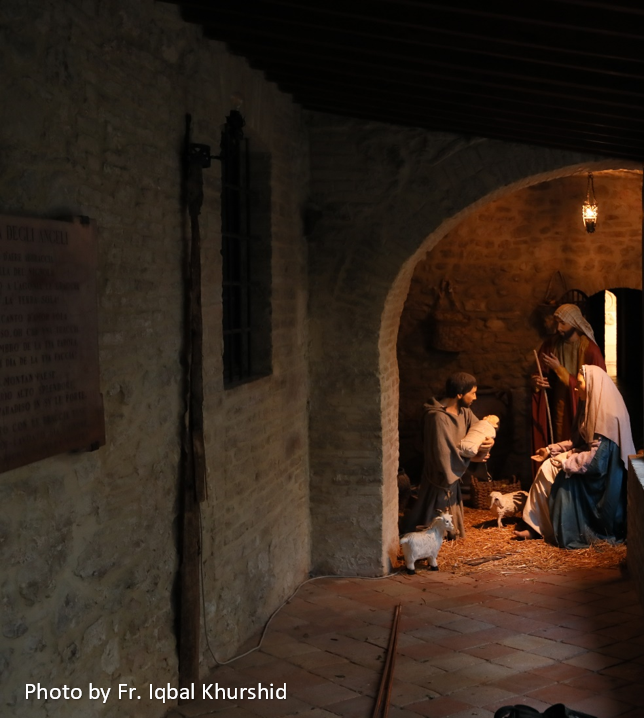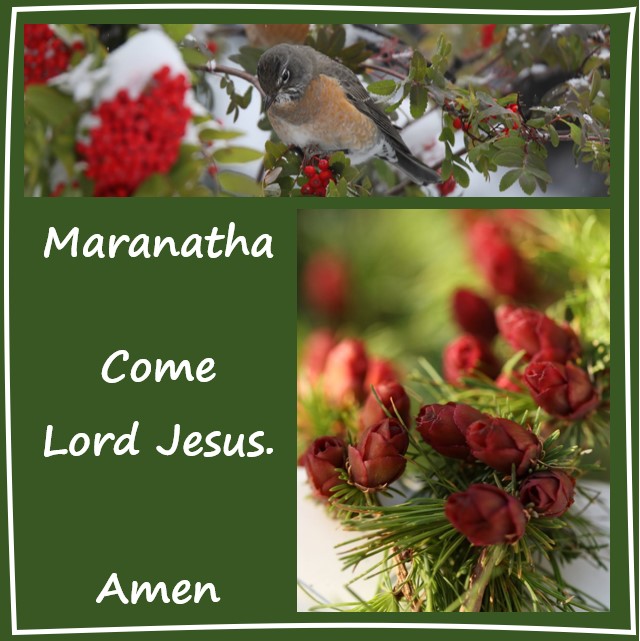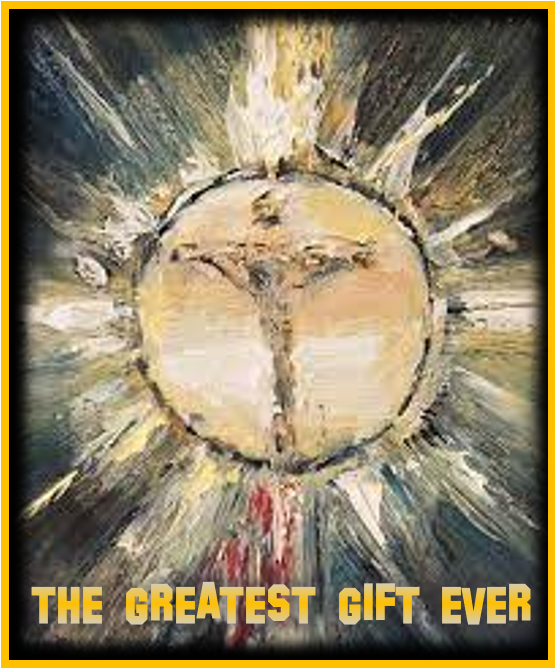
REJOICING IN THE LORD – Sunday, December 12, 2021 – 3rd Sunday of Advent
This Sunday’s liturgy opens with ““Gaudete in Domino semper” “Rejoice in the Lord always; again, I say, rejoice. Indeed, the Lord is near”. This Sunday is called “Gaudete Sunday”. Today also we start second phase of Advent season which will help us to reflect on the first coming of Jesus through the prophecies of the old and, we will be reflecting “O Antiphons”. Let’s reflect why this Sunday is called “Gaudete Sunday”? Why must we rejoice so early when Christmas is two weeks away? Someone described the Gaudete Sunday as follows: “Nature’s annual cycle is characterized by two phenomena, light and life. Out of the darkness of night comes light; out of death comes life. The transition from night to light characterizes the winter season; the transition from death to life is proper to summertime. The holy year of the Church is likewise divided into two phases which have similar characteristics.” Similar way we are reminded by the Sacred Scriptures that we must rejoice in the Lord because our Salvation has come near. Someone asked St. Mother Teresa what the secret of her joy is in serving the poor and marginalized people and her answer stunned the world “Joy is prayer — joy is strength — joy is love — joy is a net of love. . . A joyful heart is the normal result of a heart burning with love . . . loving as He loves, helping as He helps, giving as He gives, serving as He serves, rescuing as He rescues, being with Him twenty-four hours, touching Him in His distressing disguise.”
I believe we can not rejoice in the Lord unless and until we share that joy with other people. We need to create a circle of joy to bring everyone closer to the Lord. Our First Sunday of Advent was a gift sharing Sunday and looking at people who were bringing gifts, it made me to reflect on the true meaning of Christmas filled with joy. However, that joy is incomplete without hope and peace because hope comes from the Lord which never dies, and peace makes to seek the presence of the Lord during this season of Advent. How important the joy is, the following story will help?
One day, a countryman knocked hard on a monastery door. When the monk tending the gates opened, he was given a magnificent bunch of grapes.
“Brother, these are the finest my vineyard has produced. I’ve come to bear them as a gift.”
“Thank you! I will take them to the Abbot immediately, he’ll be delighted with this offering.”
“No! I brought them for you.”
“For me?” The monk blushed, for he didn’t think he deserved such a fine gift of nature.
“Yes!” insisted the man. “For whenever I knock on the door, it is you who opens it. When I needed help because the crop was destroyed by drought, you gave me a piece of bread and a cup of wine every day. I hope this bunch of grapes will bring you a little of the sun’s love, the rain’s beauty and the miracle of God, for it is he made it grow so fine.”
The monk held the grapes and spent the entire morning admiring it: it really was beautiful. Because of this, he decided to deliver the gift to the Abbot, who had always encouraged him with words of wisdom.
The Abbot was very pleased with the grapes, but he recalled that there was a sick brother in the monastery, and thought:
“I’ll give him the grapes. Who knows, they may bring some joy to his life.”
And that is what he did. But the grapes didn’t stay in the sick monk’s room for long, for he reflected:
“The cook has looked after me for so long, feeding me only the best meals. I’m sure he will enjoy these.”
When the cook appeared at lunch, to bring him his meal, he presented him with the grapes:
“They’re for you,” said the sick monk. “Since you are always coming into contact with that which nature produces, you will know what to do with this work of God.”
The cook was amazed at the beauty of the grapes and showed his assistant how perfect they were. So perfect, he thought to himself, that no one would appreciate them more than the sexton; since he was responsible for the Holy Sacrament, and many at the monastery considered him a holy man, he would be best qualified to value this marvel of nature.
The sexton, in turn, gave the grapes as a gift to the youngest novice, that he might understand that the work of God is in the smallest details of Creation. When the novice received them, his heart was filled with the Glory of the Lord, for he had never seen such beautiful grapes.
Just then, he remembered the first time he came to the monastery, and of the person who had opened the gates for him; it was that gesture which allowed him to be among this community of people who knew how to value the wonders of life.
And so, just before nightfall, he took the grapes to the monk at the gates.
“Eat and enjoy them,” he said. “For you spend most of your time alone here, and these grapes will make you very happy.”
The joy brings love and love made God to take human shape to dwell among us. St. Peter Chrysologus reflecting on that mystery of love said “When God saw the world falling to ruin because of fear, he immediately acted to call it back to himself with love. He invited it by his grace, preserved it by his love, and embraced it with compassion. When the earth had become hardened in evil, God sent the flood both to punish and to release it. He called Noah to be the father of a new era, urged him with kind words, and showed that he trusted him; he gave him fatherly instruction about the present calamity, and through his grace consoled him with hope for the future. But God did not merely issue commands; rather with Noah sharing the work, he filled the ark with the future seed of the whole world. The sense of loving fellowship thus engendered removed servile fear, and a mutual love could continue to preserve what shared labor had affected”.
Further he says “God called Abraham out of the heathen world, symbolically lengthened his name, and made him the father of all believers. God walked with him on his journeys, protected him in foreign lands, enriched him with earthly possessions, and honored him with victories. He made a covenant with him, saved him from harm, accepted his hospitality, and astonished him by giving him the offspring he had despaired of. Favored with so many graces and drawn by such great sweetness of divine love, Abraham was to learn to love God rather than fear him and love rather than fear was to inspire his worship”.
Today we are given a personality from the Old Testament to walk with is Prophet Zephaniah who proclaims the message of joy his people; “Sing aloud, O daughter Zion; shout, O Israel! Rejoice and exult with all your heart, O daughter of Jerusalem!” He is among twelve minor prophets who encourages people to trust in the Lord. Do we help people to experience the joy of the Lord?
St. Peter continue to help us to understand the mystery of his Incarnation “In all the events we have recalled, the flame of divine love enkindled human hearts and its intoxication overflowed into men’s senses. Wounded by love, they longed to look upon God with their bodily eyes. Yet how could our narrow human vision apprehend God, whom the whole world cannot contain? But the law of love is not concerned with what will be, what ought to be, what can be. Love does not reflect; it is unreasonable and knows no moderation. Love refuses to be consoled when its goal proves impossible, despises all hindrances to the attainment of its object. Love destroys the lover if he cannot obtain what he loves; love follows its own promptings and does not think of right and wrong. Love inflames desire which impels it toward things that are forbidden. But why continue?
It is intolerable for love not to see the object of its longing. That is why whatever reward they merited was nothing to the saints if they could not see the Lord. A love that desires to see God may not have reasonableness on its side, but it is the evidence of filial love. It gave Moses the temerity to say: If I have found favor in your eyes, show me your face. It inspired the psalmist to make the same prayer: Show me your face. Even the pagans made their images for this purpose: they wanted actually to see what they mistakenly revered”.
The season of Advent and Christmas encourages everyone to share joy and encourages everyone. Two men, both seriously ill, occupied the same hospital room. One man was allowed to sit up in his bed for an hour each afternoon to help drain the fluid from his lungs. His bed was next to the room’s only window. The other man had to spend all his time flat on his back. The men talked for hours on end. They spoke of their wives and families, their homes, their jobs, their involvement in the military service, where they had been on vacation.
Every afternoon when the man in the bed by the window could sit up, he would pass the time by describing to his roommate all the things he could see outside the window. The man in the other bed began to live for those one-hour periods where his world would be broadened and enlivened by all the activity and color of the world outside. The window overlooked a park with a lovely lake. Ducks and swans played on the water while children sailed their model boats. Young lovers walked arm in arm amidst flowers of every color and a fine view of the city skyline could be seen in the distance. As the man by the window described all this in exquisite detail, the man on the other side of the room would close his eyes and imagine the picturesque scene.
One warm afternoon the man by the window described a parade passing by. Although the other man couldn’t hear the band – he could see it in his mind’s eye as the gentleman by the window portrayed it with descriptive words. Days and weeks passed. One morning, the day nurse arrived to bring water for their baths, only to find the lifeless body of the man by the window, who had died peacefully in his sleep. She was saddened and called the hospital attendants to take the body away. As soon as it seemed appropriate, the other man asked if he could be moved next to the window. The nurse was happy to make the switch, and after making sure he was comfortable, she left him alone.
Slowly, painfully, he propped himself up on one elbow to take his first look at the real world outside. He strained to slowly turn to look out the window beside the bed. It faced a blank wall. The man asked the nurse what could have compelled his deceased roommate who had described such wonderful things outside this window. The nurse responded that the man was blind and could not even see the wall.
She said, “Perhaps he just wanted to encourage you.”
St. Paul through the Second Reading is doing the same to encourage us to believe and rejoice in the Lord. As days are drawing near to celebrate the Nativity of the Lord, the spirit of joy is growing tremendously, reminding us to rejoice in him “who become flesh and dwelt among us”. He exhorts us to have no anxiety, to have no despair about anything, but rather, in every circumstance, to make our requests, our needs, our worries known to God “by prayer and supplication”. The awareness that we can always turn to the Lord in our difficulties, and that he never rejects our invocations, is a great reason for joy. No worry, no fear will ever be able to take away this serenity which comes not from human things, from human comforts, no: the serenity that comes from God, from knowing that God lovingly guides our lives, and he always does so. Even in the midst of problems and suffering, this certainty fosters hope and courage.
How can we rejoice in the Lord? I believe today’s Gospel has the answer and solution. There is a question posed three times: “What shall we do?”. It is raised to John the Baptist by three categories of people: First, the crowd in general; second, the publicans or tax collectors; and third, some soldiers. Each of these groups questions the prophet on what must be done to implement the conversion that he is preaching. John’s reply to the question of the crowd is sharing essential goods. He told the first group, the crowd, to share necessities, and therefore says: “He who has two coats, let him share with him who has none; and he who has food, let him do likewise”. What a solid answer to the question “how can we rejoice in the Lord?”. The Author to the Letter to Hebrews encouraging everyone to continue to share love, joy and hospitality with everyone; “Let mutual love continue. Do not neglect to show hospitality to strangers, for by doing that some have entertained angels without knowing it. Remember those who are in prison, as though you were in prison with them; those who are being tortured, as though you yourselves were being tortured. Let marriage be held in honor by all and let the marriage bed be kept undefiled; for God will judge fornicators and adulterers. Keep your lives free from the love of money and be content with what you have; for he has said, “I will never leave you or forsake you.” So we can say with confidence, “The Lord is my helper; I will not be afraid. What can anyone do to me?”
St. John the Baptist helps the second group, the tax collectors, to collect no more than the amount owed. What does this mean? No taking ‘bribes’, John the Baptist is clear. One of the aspects I believe, if we want to rejoice in the Lord, is to learn to be contented in what we have. Why we need to be contented, the Book of Proverbs has the answer? “Two things I ask of you; do not deny them to me before I die: Remove far from me falsehood and lying; give me neither poverty nor riches; feed me with the food that I need, or I shall be full, and deny you, and say, “Who is the Lord?” or I shall be poor, and steal, and profane the name of my God” (30:7-9). Moreover, wishing to have more will lead us to greed and envy. And he tells the third group, the soldiers, not to extort anything from anyone and to be content with their wages. There are three answers to the three questions of these groups. Three answers for an identical path of repentance, which is manifested in concrete commitments to justice and solidarity. It is the path that Jesus points to in all his preaching: the path of diligent love for neighbour.
If we want to rejoice in the Lord, we must feel that this question — “What shall we do?” We can do:
If we judge, let’s love
If we criticize, let’s love
If we hate, let’s love
If we fight, let’s love
If we hurt, let’s love
If we divide, let’s love
If we fight, let’s love
If we gossip, let’s love
(If we……add your own weaknesses and shortcomings during this week)
If we want to rejoice then it is necessary to repent, to change direction and take the path of justice, solidarity, sobriety: these are the essential values of a fully human and genuinely Christian life. Repent! It sums up the message of the Baptist. And the Liturgy of this Third Sunday of Advent helps us to rediscover a special dimension of repentance: joy. Whoever repents and approaches the Lord, feels joy. Let me conclude my reflection with following story:
A woman who was traveling alone in the mountains found a precious stone in a stream. The next day she met another traveler who was hungry, the woman opened her bag to share her food. The hungry traveler saw the precious stone and asked the woman to give it to him. She did so without hesitation. The traveler left, rejoicing in his great fortune. He knew the stone was worth enough to give him security for a lifetime.
But a few days later he came back to return the stone to the woman. I’ve been thinking,” he said, “I know how valuable the stone is, but I give it back in the hope that you can give me something even more precious. Give me what you have within you that enabled you to give me the stone.”
The woman smiled, “The joy of giving!” Can we rejoice in the Lord without giving?
Other Sermons In This Series

30th Sunday in Ordinary Time Year C ~ October 23, 2022
October 21, 2022

2nd Sunday of Advent- Year A – December 4, 2022
December 02, 2022


